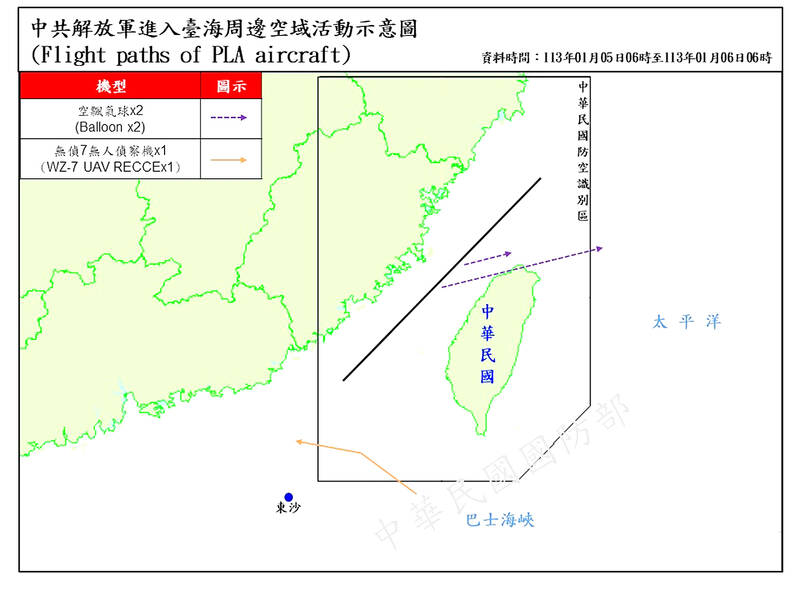China is threatening aviation safety and waging psychological warfare on the Taiwanese public with a spate of balloons spotted near or over Taiwan ahead of Saturday’s presidential and legislative elections, the Ministry of National Defense said yesterday.
The potential for China to use balloons for spying became a global issue in February last year when the US shot down what it said was a Chinese surveillance balloon.
China said the balloon was a civilian craft that accidentally drifted astray.

Photo courtesy of the Ministry of National Defense
Taiwan is on high alert for Chinese military and political activity ahead of the elections.
Taipei said China is exerting military and economic pressure in an attempt to interfere in the vote.
Since last month the ministry has reported several instances of Chinese balloons flying over the Taiwan Strait.
It said this week that some balloons had floated over Taiwan proper near major air bases.
The balloons were a “serious threat” to international aviation safety given their flight paths, it said in a statement yesterday.
“We also express our condemnation of the Chinese communists’ disregard for aviation safety and its disregard for the safety of passengers on cross-strait and international flights,” it said.
The ministry said that its analysis was that the balloons were part of China’s “gray zone” tactics against Taiwan “in an attempt to use cognitive warfare to affect the morale of our people.”
Asked whether it has shot down any of the balloons or intends to do so, the ministry said it would respond according to the altitude and possible purpose of airborne objects and the level of threat they pose.
So far, it has taken appropriate measures according to the “rules on responding to contingencies during normal times,” it said.
Calls seeking comment to the Chinese Ministry of National Defence, China’s Taiwan Affairs Office and the Chinese Civil Aviation Administration were not answered yesterday outside of work hours.
China’s defence ministry last week declined to comment on the balloons at a monthly news conference.
In a separate statement yesterday, the Ministry of Defense said that during the previous 24 hours it had detected two more Chinese balloons, one of which briefly flew over the far northern tip of the nation.
It said it thought the balloons were mostly for weather monitoring, driven by prevailing winds at this time of year, and the comments on them being part of China’s “gray zone” activities are stronger than previous statements.
A Western security source, speaking on condition of anonymity as they were not authorized to speak to the media, said that China was sending a very simple pre-election message to Taiwan with the balloons.
“We are watching you closely and you can’t hide,” the source said.
Additional reporting by CNA

CHAOS: Iranians took to the streets playing celebratory music after reports of Khamenei’s death on Saturday, while mourners also gathered in Tehran yesterday Iranian Supreme Leader Ayatollah Ali Khamenei was killed in a major attack on Iran launched by Israel and the US, throwing the future of the Islamic republic into doubt and raising the risk of regional instability. Iranian state television and the state-run IRNA news agency announced the 86-year-old’s death early yesterday. US President Donald Trump said it gave Iranians their “greatest chance” to “take back” their country. The announcements came after a joint US and Israeli aerial bombardment that targeted Iranian military and governmental sites. Trump said the “heavy and pinpoint bombing” would continue through the week or as long

TRUST: The KMT said it respected the US’ timing and considerations, and hoped it would continue to honor its commitments to helping Taiwan bolster its defenses and deterrence US President Donald Trump is delaying a multibillion-dollar arms sale to Taiwan to ensure his visit to Beijing is successful, a New York Times report said. The weapons sales package has stalled in the US Department of State, the report said, citing US officials it did not identify. The White House has told agencies not to push forward ahead of Trump’s meeting with Chinese President Xi Jinping (習近平), it said. The two last month held a phone call to discuss trade and geopolitical flashpoints ahead of the summit. Xi raised the Taiwan issue and urged the US to handle arms sales to

A magnitude 5.6 earthquake struck off the coast of Yilan County at 12:37pm today, with clear shaking felt across much of northern Taiwan. There were no immediate reports of damage. The epicenter of the quake was 16.9km east-southeast of Yilan County Hall offshore at a depth of 66.8km, Central Weather Administration (CWA) data showed. The maximum intensity registered at a 4 in Yilan County’s Nanao Township (南澳) on Taiwan’s seven-tier scale. Other parts of Yilan, as well as certain areas of Hualien County, Taipei, New Taipei City, Taoyuan, Hsinchu County, Taichung and Miaoli County, recorded intensities of 3. Residents of Yilan County and Taipei received

Taiwan has secured another breakthrough in fruit exports, with jujubes, dragon fruit and lychees approved for shipment to the EU, the Ministry of Agriculture said yesterday. The Animal and Plant Health Inspection Agency on Thursday received formal notification of the approval from the EU, the ministry said, adding that the decision was expected to expand Taiwanese fruit producers’ access to high-end European markets. Taiwan exported 126 tonnes of lychees last year, valued at US$1.48 million, with Japan accounting for 102 tonnes. Other export destinations included New Zealand, Hong Kong, the US and Australia, ministry data showed. Jujube exports totaled 103 tonnes, valued at